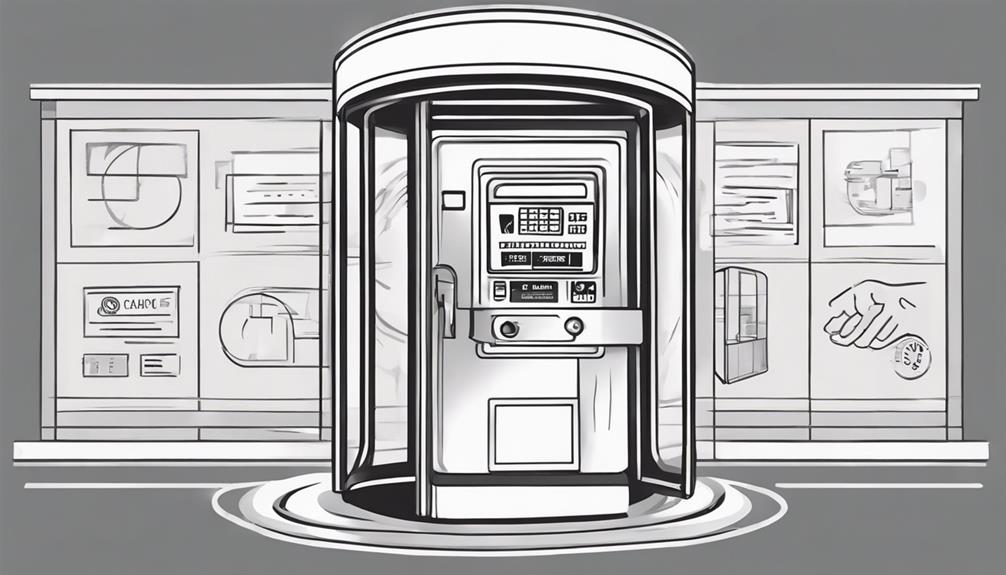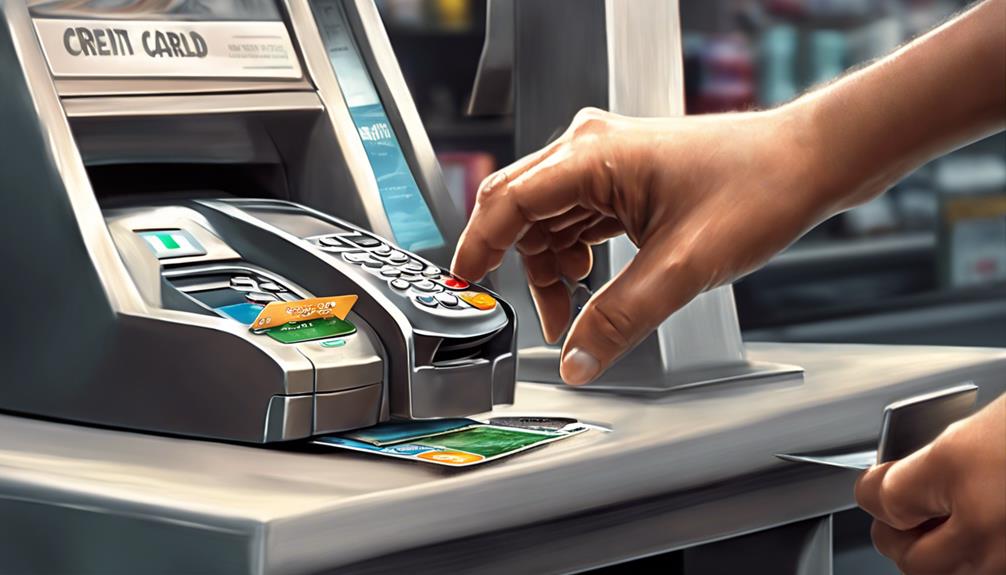Credit cards, a ubiquitous financial tool, play a pivotal role in modern-day transactions. Understanding the intricate mechanisms behind how credit cards operate is essential for informed financial decision-making. From the basic concept of credit limits to the complexities of interest rates and fees, there is a wealth of information that can empower individuals to leverage credit cards effectively. By unraveling the nuances of credit card functionality, one can navigate the financial landscape with greater confidence and control.
Key Takeaways
- Credit cards allow borrowing with a set limit and require repayment terms.
- Interest accrues based on average daily balance and APR.
- Types vary from rewards to secured cards, tailored to individual needs.
- Responsible practices include timely payments and managing credit utilization for a healthy financial profile.
What Is a Credit Card?

A credit card is a financial instrument that enables individuals to make purchases on credit, with an obligation to reimburse the borrowed amount at a future date. Unlike debit cards that draw directly from one's bank account, credit cards offer a line of credit from the card issuer. Each credit card comes with a predetermined credit limit, which signifies the maximum amount that can be spent using the card. When using a credit card, individuals essentially borrow money from the card issuer, and this borrowed amount needs to be repaid following the terms and conditions outlined by the issuer.
Managing a credit card responsibly is crucial for maintaining a good credit score and overall financial well-being. Timely payments on the credit card balance are essential for a positive credit history. By utilizing a credit card wisely and making timely payments, individuals can establish themselves as reliable borrowers, which can lead to better credit opportunities in the future.
Understanding Credit Card Functions
Moving from the concept of what a credit card is to understanding its functions involves dissecting the operational mechanisms that govern how credit cards facilitate financial transactions. When exploring the functions of credit cards, several key aspects come into play:
- Credit Limit: The predetermined maximum amount that can be borrowed on a credit card, set by the issuer.
- Authorization: Each transaction made with a credit card requires approval from the acquiring bank, credit card network, and issuer to validate the purchase.
- Interest Charges and Timely Payments: Interest accrues on unpaid balances, underscoring the importance of making timely payments to avoid additional costs. Payments are processed through the network, with the purchase amount initially put on hold until the transaction is finalized.
Understanding these functions is crucial for responsible credit card usage, ensuring that users can effectively manage their finances and make informed decisions regarding borrowing and repayment.
Credit Card Interest Mechanics

Credit card interest mechanics involve intricate calculations based on the average daily balance and the APR. The interest rate directly impacts the amount of interest accrued on any outstanding balance left unpaid. Understanding these points is crucial for managing credit card balances effectively and minimizing interest costs.
Interest Calculation Methods
Interest on credit cards is calculated using various methods, such as the average daily balance, daily balance, and adjusted balance. Understanding these methods is crucial for managing and minimizing interest charges effectively. Here are three key points to consider:
- Average Daily Balance Method: This method involves adding up the daily balances and dividing by the number of days in the billing cycle to determine interest charges.
- Daily Balance Method: Interest is calculated based on the balance each day, which can result in higher charges if the balance fluctuates during the billing cycle.
- Adjusted Balance Method: This method considers the balance at the beginning of the cycle minus any payments or credits during the cycle to calculate the interest amount.
Impact on Balances
When exploring the mechanics of credit card interest, understanding how different calculation methods impact balances is essential for effective financial management. Credit card interest is based on the average daily balance, not just the month-end balance, with the Annual Percentage Rate (APR) applied to the outstanding amount. Carrying a balance on the credit card results in interest accruing over time, increasing the total owed. To avoid interest charges, it's crucial to pay the full balance by the due date, utilizing the interest-free grace period. Making only the minimum payment leads to interest accruing on the remaining balance, ultimately resulting in higher overall costs.
| Term | Explanation |
|---|---|
| Average Daily Balance | Balance calculated by averaging each day's balance over the billing cycle. |
| Minimum Payment | The smallest amount you must pay by the due date to keep the account in good standing. |
| Grace Period | Period during which you can pay your balance in full without accruing interest charges. |
Unveiling Credit Card Types
Among the array of financial tools available, delving into the realm of credit card types unveils a spectrum of options tailored to diverse consumer needs and preferences. Understanding the nuances of different credit cards is crucial in aligning one's choice with their financial goals and spending habits. Here are three key credit card types to consider:
- Rewards Cards: These cards offer points, miles, or cash back on purchases, providing incentives for regular card usage and spending.
- Secured Credit Cards: Requiring a security deposit, these cards are ideal for credit building purposes, especially for individuals looking to establish or rebuild their credit history.
- Co-Branded Cards: Designed in partnership with specific airlines or hotels, these cards offer rewards tailored to frequent travelers, enhancing their overall travel experience and providing additional benefits.
Navigating Credit Card Fees

Understanding the intricate landscape of credit card fees is paramount for prudent financial management and decision-making. Credit card fees encompass a range of charges such as annual fees, late fees, cash advance fees, balance transfer fees, and foreign transaction fees. These fees can vary among different credit cards, necessitating a careful comparison of fee structures to make informed choices. Effective financial management involves being cognizant of how these fees can quickly accumulate and impact overall credit card usage. By understanding the fee associated with the credit card you hold, you can steer clear of unnecessary charges and ultimately save money in the long term. It is crucial to scrutinize the terms and conditions of your credit card agreement to avoid surprises and to ensure that you are making financially sound decisions. By staying informed about credit card fees, you can take proactive steps to manage your finances efficiently and minimize additional expenses.
Credit Vs. Debit Cards Comparison
Credit and debit cards serve as essential financial tools, each with distinct characteristics and implications for consumers. When comparing credit and debit cards, several key differences must be considered:
- Balance and Pay: Credit cards allow users to carry a balance from month to month, requiring minimum payments with the option to pay in full. Debit cards, however, deduct funds directly from the linked checking account, limiting spending to available funds.
- Interest Charges: Credit cards incur interest charges on unpaid balances, making them costlier if not paid in full. On the other hand, debit cards do not involve interest charges as transactions are immediately deducted from the checking account.
- Credit Scores and Building Credit: Responsible use of credit cards can help build credit scores by demonstrating timely payments and managing balances. Debit card usage, in contrast, does not contribute to credit building as transactions are not reported to credit bureaus.
Choosing between credit and debit cards depends on individual financial needs, credit building goals, and spending habits, making it essential to understand the implications of each type of card.
Credit Card Usage Tips

When managing credit cards, employing strategic usage tips can optimize financial outcomes and enhance cardholder experiences. To begin, make it a priority to pay your credit card bill in full each month to avoid accruing interest charges. This practice not only helps maintain a good credit score but also prevents unnecessary debt accumulation. Additionally, it is crucial to monitor your credit card statements regularly for any unauthorized charges or errors, ensuring the accuracy of your transactions. Utilizing credit card rewards programs is another beneficial strategy to consider, allowing you to earn cash back, points, or miles on your purchases. Setting up automatic payments can help you stay organized and ensure timely payments of your credit card bills, avoiding late fees. Lastly, be mindful of overspending and always stay within your credit limit to maintain financial stability and avoid potential financial pitfalls. By following these credit card usage tips, you can make the most of your credit card while minimizing risks.
Pros and Cons Analysis
Examining the advantages and disadvantages of utilizing credit cards reveals a nuanced perspective on their financial impact and utility in various consumer circumstances.
Key Points:
- Build Credit: Responsible use of credit cards can help individuals build credit history, leading to improved credit scores and better borrowing terms.
- High-Interest Payments: Accumulating unpaid balances on credit cards can result in high-interest payments, increasing the overall cost of purchases.
- Negative Impact: Missing credit card payments can have a negative impact on credit scores, affecting future borrowing opportunities and financial stability.
Understanding these factors is crucial for making informed decisions regarding credit card usage. While credit cards offer benefits such as fraud protection and rewards, it is essential to manage them responsibly to avoid pitfalls like high-interest payments and negative credit score implications. By using credit cards wisely, individuals can leverage them to improve their creditworthiness and access premium credit card options in the future.
Building Credit With Cards

Transitioning from the analysis of pros and cons to the exploration of building credit with cards unveils the pivotal role responsible credit card usage plays in shaping individuals' financial credibility and access to favorable borrowing terms. To make the most of credit cards, it is crucial to use them responsibly. By making timely payments and managing your credit utilization ratio, you can build a positive credit history and improve your credit score. Credit card issuers report your payment activity to credit bureaus, influencing how lenders perceive your creditworthiness. Demonstrating responsible credit card use by paying back your balances in full showcases your ability to handle credit responsibly. As you build credit with credit cards, you open doors to better loan terms, lower interest rates, and increased borrowing opportunities. It is essential to compare different types of credit cards and their interest rates to choose the ones that best align with your financial goals and spending habits.
Credit Card Shopping Guide
To effectively navigate the realm of credit card options and make well-informed decisions, it is essential to carefully compare key features such as rewards, fees, and interest rates.
- Intro APR Offers: Look for credit cards that provide an introductory Annual Percentage Rate (APR) offer, allowing you to make purchases or balance transfers with low or no interest for a specified period.
- Rewards Programs: Consider credit cards with rewards programs that align with your spending habits, offering cash back, points, or miles that can be redeemed for various benefits such as travel, merchandise, or statement credits.
- Fee Structure Evaluation: When selecting a credit card, pay attention to factors like annual fees, balance transfer fees, and foreign transaction fees, as they can significantly impact the overall cost of using the card.
Responsible Credit Card Practices

Understanding the significance of payment due dates and maintaining a healthy credit utilization ratio are fundamental aspects of responsible credit card practices. By ensuring payments are made on time and keeping credit card balances low relative to the credit limit, individuals can demonstrate financial responsibility and positively impact their credit scores. Monitoring these factors regularly and implementing strategies to manage credit card utilization can contribute to overall financial security and stability.
Payment Due Dates
Adhering to payment due dates is a crucial aspect of maintaining financial discipline and a positive credit card history.
Key Points:
- Timely Payments: Ensuring credit card payments are made on time or before the due date is vital for a good standing on your credit card account.
- Late Fees and Credit Score Impact: Missing a credit card payment deadline can lead to late fees and negatively impact your credit score.
- Statement Details: Credit card statements provide essential information such as the minimum payment required, statement balance, available credit, and breakdown of charges and fees.
It is imperative to practice responsible credit card habits by paying at least the minimum amount due by the due date to avoid penalties and uphold a healthy credit profile.
Credit Utilization Ratio
Maintaining a low credit utilization ratio is a fundamental practice in demonstrating responsible credit card usage and positively influencing your credit score. The credit utilization ratio is the percentage of available credit you are using, calculated by dividing your credit card balance by your credit limit. It is a crucial factor in credit scoring, with keeping it below 30% recommended for a good credit score. Lower credit utilization ratios showcase responsible credit card practices to lenders. Regularly monitoring and managing your credit utilization ratio can have a positive impact on your credit score over time. By understanding and maintaining a low credit utilization ratio, you can work towards building and maintaining a strong credit profile.
Frequently Asked Questions
How Exactly Do Credit Cards Work?
Credit cards operate by granting users a revolving line of credit, known as credit limits, allowing purchases beyond their immediate financial means. Interest rates apply to unpaid balances, with varying rates based on the cardholder's creditworthiness. Rewards programs offer incentives for card usage, while balance transfers allow shifting debt from one card to another. Late fees are charged for missed payments, and fraud protection safeguards against unauthorized transactions. Understanding credit scores is crucial, as they impact card approval and terms. Other factors to consider include annual fees and cash advances.
What Is the Minimum Payment on a $3000 Credit Card?
The minimum payment on a $3000 credit card typically ranges from $30 to $90, based on the issuer's terms. Making only minimum payments can lead to high interest charges and prolong payoff time. To manage $3000 credit card debt effectively, exceeding minimum payments is advisable to reduce interest costs and clear the balance faster. Understanding minimum payment terms is crucial for sound credit card debt management, promoting financial stability and minimizing unnecessary interest accumulation.
What Is the Number 1 Rule of Using Credit Cards?
The number 1 rule of using credit cards is responsible spending. Maintaining a low credit utilization ratio, staying informed about interest rates, and prioritizing timely payments are crucial. Payment history greatly impacts credit score. Understanding credit limits helps manage finances effectively, while being vigilant about fraud protection is essential. Evaluating rewards programs, annual fees, and cash back options can optimize credit card benefits. Balancing these factors fosters financial health and stability.
How Should a Beginner Use a Credit Card?
When starting to use a credit card, beginners should be mindful of their credit limit, interest rates, and payment due dates. Understanding these factors is crucial for managing finances responsibly and avoiding unnecessary fees. Building a good credit score through timely payments and responsible spending is key. It's also important to consider annual fees, rewards programs, balance transfers, fraud protection, grace periods, and the implications of cash advances.
Conclusion
In conclusion, credit cards serve as a valuable financial tool for individuals to make purchases, build credit, and manage their finances. By understanding how credit cards work, including interest mechanics, types, and fees, cardholders can make informed decisions to maximize the benefits and minimize the drawbacks. Just as a well-tuned engine requires regular maintenance to function at its best, responsible credit card usage and timely payments are essential for a healthy financial future.
